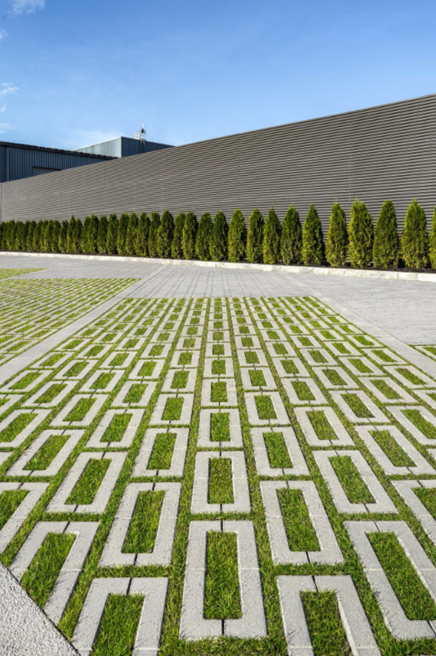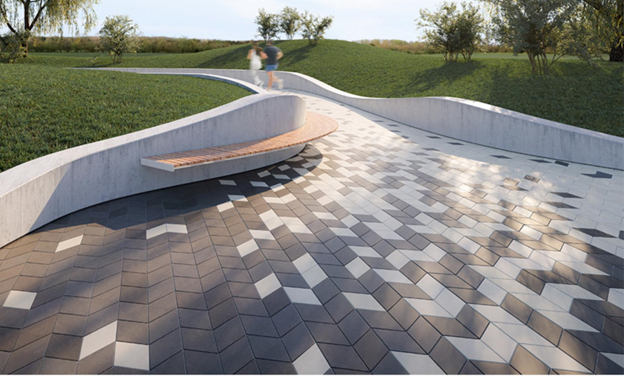
Permeable pavements are a growing trend in commercial design — and there are real benefits to their use. By incorporating permeable elements into a design, architects can offset a project’s impact on the environment, the amount of waste water to be funneled away from the site, and reduce the risk of severe flooding.
But permeable systems shouldn’t be entered into lightly. From an installation and maintenance standpoint, there are items that must be considered to ensure the system maintains its appearance and long-term performance.
Permeable Paver Design
A study from the Morton Arboretum reviewed different pavement systems used in outdoor design: The research found that for every $1 spent on asphalt repair over 50 years, only $.02 would be spent on a permeable pavement system. These porous concrete materials offer commercial architects sustainability and owners a low maintenance solution over the lifetime of the product.
Studies also indicate that during freezing conditions, permeable pavers offer a durable and safe solution to outdoor hardscape designs. The pavement system is less prone to freeze-thaw damage, and the porous design allows water to pass through the surface more easily so that ice and snow are less likely to build up.
But all building products require maintenance, and depending on the materials used to fill in the interlocking pavement units, the paver system can get clogged with sediment and other debris.

When Should I Clean My Permeable Pavers?
While permeable pavers require little maintenance, they’re still at the mercy of the outdoors: Airborne particles, residue or grit from tires, soil and other organic substances could get trapped in the spaces between them. Most of that will get trapped in the top inch of the openings between the paving units — often, all you’ll need to clean the area is a durable broom.
Professional Engineer Lincoln Paiva recommends inspecting and cleaning permeable pavers twice a year. This ensures that the paver points don’t get clogged with sediment that could get trapped between the joints. Regular check-ins also:
- prevent weeds from sprouting up between the pavers;
- keep water from pooling up and stagnating on the surface;
- keep the materials from eroding over time.
Severe weather events like rain storms or heavy snow and ice precipitation are also great opportunities to check on your paving system to ensure that there’s no pooling water or clogging that needs to be addressed. When architects work with pavers from Techo-Bloc, however, they can rest easy knowing that the product warranty covers any deterioration that might be caused by de-icing agents used during winter storms.
Permeable Paver Maintenance Tips

“Techo-Bloc pavers require minimal maintenance,” explains Lincoln, “They’re concrete products and are manufactured at the plant to comply with the highest Canadian standards for strength and durability — they’re heavily monitored during each step in the manufacturing process.”
And we do mean highest standards: The CSA A231.2 specification that Techo-Bloc pavers complies with is one of the strictest in the world, stricter than the U.S.'s ASTM C936 specification, which is the common benchmark for U.S.-based manufacturers.
There are a few cleaning tips that experts recommend for permeable pavers when the time comes for maintenance.
Sealers and Protectants
Sealers can help to prevent stains and will reduce the growth of weeds between the spaces of the pavers. “Every three years or so, apply a protectant or coating,” says Pete Baloglou with Techo-Bloc. “Protectants and sealer products can help stabilize the joints of the paver system and adds to the adhesion of joints,” he explains.
And applying a sealer helps your paver design last for years. “Putting a protectant down delays the cosmetic decline of the product,” says Pete.

Dealing With Weeds
Weeds happen because organic matter gets blown around and trapped between the pavers. While a protectant can keep weed growth down, sweeping the pavers with a stiff bristle broom can help prevent them from sprouting up.
Cleaning Equipment
“Owners can use a broom to remove sediment, but use caution if you’re working with a power washer,” says Lincoln. If you’re cleaning a larger area, you might use a mechanical sweeper or vacuum. “If you use a mechanical cleaner, test a small area to see if it’s safe,” he explains.
Clogged Paver Systems
Sometimes we neglect the care and maintenance of our building exteriors due to unforeseen circumstances and wind up with a clogged paver design. Thankfully, the fix doesn’t include reinstalling the entire paver system. “If the paver joint is clogged, just the joint can be removed and fixed, instead of having to replace the entire paver,” says Lincoln.
Maintenance Mistakes to Avoid
To protect your pavers and ensure that you don’t void the warranty, experts from Techo-Bloc have a few tips:
- During winter storms, avoid using sand on the area: It can cause clogging in between the pavers. (De-icing solvent is fine to use, however.)
- Pay close attention to the product’s warranty, especially when it comes to installation. (You can get installation information for Techo-Bloc permeable products here.)
- Power washers can damage the integrity of the pavers, so don’t use them. “These ruin the surface of the concrete, and push sediment into the joints, further down where you can’t take care of it,” says Pete.
Keep Your Permeable Pavers Looking Great for the Long-Term
Techo-Bloc permeable pavers offer commercial building exteriors a sustainable and beautiful solution that will stand the test of time. And an industry-leading lifetime transferable warranty, whether for commercial or residential locations, means building owners can rest easy because the product is guaranteed to be durable.
“You want a space to look nice,” says Pete Baloglou, “so why not put in the effort and care into the system to maintain how it looks?” By inspecting the pavement products a few times a year, and doing some low-maintenance cleaning, building owners can ensure their paver design will last for decades.
“If you take care of your pavers,” says Pete, “they’ll take care of you.”
Click here to learn more about our permeable pavers. Or click here to talk to your local rep about the best paver choice for your project.
